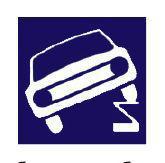SAS Urban Survival Handbook (25 page)
Read SAS Urban Survival Handbook Online
Authors: John Wiseman
Tags: #Health & Fitness, #Reference, #Survival, #Fiction, #Safety, #Self-Help, #Personal & Practical Guides, #General, #Survival Skills
If you MUST use pesticides, take care not to breathe in the spray/mist yourself. You should wear a face mask to help avoid inhalation, goggles for your eyes and gloves to prevent skin contact—at the very least.
Keep the poison well away from garden ponds with fish, frogs or other useful animals in them and from any other animals in the garden—whether pet tortoises or friendly visitors. Unfortunately there is little you can do to protect birds. If they eat the slugs that eat your pellets or the flies you spray with insecticide, the poisons will be passed on through the food chain even if not by direct contact. Keep children, adults and animals out of the garden after spraying.
Do not overuse poisons. Most of the weedkillers and insecticides in common use today are extremely potent, designed for impatient gardeners.
Bonfires
Bonfires are frequently forbidden in urban areas because of air pollution and fire hazards. Composting is the easiest way of disposing of garden waste—providing a useful extra for the flower beds. If fires are permitted keep them well away from trees and fences. Avoid any possibility that the house, garage or shed could be endangered if the fire should get out of control. NEVER throw fuel on if the fire isn’t burning as fast as you would like. Do not light them with petrol or paraffin. Build them properly and they will burn with ease (see FIRE!).
Avoid large unstable bonfires. If you have a lot to burn, don’t make one massive pile and then set light to it! Have a medium-sized controllable fire, which you can add to gradually as it burns down. Start with newspaper, kindling and fire lighters to get the fire going.
Incinerators will contain a small fire. If you buy one, read the manufacturer’s instructions carefully. ALWAYS keep a bucket of water, a fire extinguisher or fire-beater handy when having a bonfire OR a barbecue.

WARNING
Do not burn rubber or plastics. The fumes may be deadly. DON’T inhale too much smoke, even without fumes it contains CARBON MONOXIDE. NEVER put aerosols on the fire—they could blow up. Only build a fire on earth—never tarmac, and never concrete or stone which might explode.
CHILDPROOFING
- ■
Make sure fences are secure and gates lockable, so that children cannot go out or squeeze through by themselves. - ■
Garden ponds and swimming pools should be fenced off if young children are allowed in a garden unsupervised. In some countries they must be fenced by law. Consider filling in ponds with earth until children are older. - ■
Water butts should be kept covered. - ■
Empty paddling pools after use and do not let children play in them unsupervised. A plastic pool left out in the rain can rapidly fill to a couple of inches—quite enough for a small child to drown in, if they fall face down. - ■
Teach children not to eat any part of plants or to suck their fingers after touching them. Bought seeds may have been coated with toxic chemicals to make them keep. - ■
Keep sand pits covered when not in use—this will keep out rainwater and mess from any visiting cats or dogs. - ■
Site swings and play equipment on or over grass, not on hard surfaces. - ■
Do not let children play near greenhouses, garden frames or any structures which have glass panes. - ■
Don’t let children use garden tools. Always keep children away when you are mowing the lawn.
In the garden:
- ◑ Make sure your gardening footwear is sturdy enough to withstand crushing—or piercing from above or below.
- ◑ Use each tool for the job it was intended to do.
- ◑ Clean and oil tools after use.
- ◑ Don’t use tools with loose or ‘bodged’ handles.
- ◑ Put away all tools after use, especially if there are children or pets about.
- ◑ Wear gloves—don’t handle soil excessively.
- ◑ Always wash your hands, when you finish gardening.
- ◑ Avoid hand-to-mouth contact—which includes smoking, eating or drinking.
- ◑ Check when hedge-trimming that there are no hidden posts, wires—or birds’ nests.
- ◑ Avoid lifting heavy weights which are a strain.

WARNING
DON’T attempt major work on trees, especially if you have to
a
climb to do so. Get prof essional advice—to avoid injury and making a tree unsafe.
Electricity in the garden
Most accidents happen (and most fatalities are caused) when using electric lawnmowers and hedgetrimmers. You MUST protect yourself with an RCD/RCB/ELCB (see Electricity). In most cases it’s a good idea to drape the flex from an appliance over your shoulder to keep it out of harm’s way.
DON’T wander about with electrical mowers. Try to mow in more-or-less straight lines or with some sort of method—not up and down slopes, but along them. That way you stand less chance of ‘mowing’ the cable or your feet, than you do using the mower like a vacuum cleaner!
Extension cables are only temporary solutions. You should choose ones designed for outdoor use—with rubber fittings for extra protection against breakage and moisture. Coiled extension cable MUST be fully unwound before use, to prevent overheating and the possibility of fire.
ALWAYS connect the extension to the appliance FIRST, then—making sure the appliance is switched off—make the connection at the mains socket and switch on. Don’t switch on the appliance until you have reached the place where you intend to start working. When you have finished, ALWAYS switch off the appliance, then go to the main socket and switch it off and pull out the plug. Then you can remove the extension cable from the appliance.
NEVER ‘tinker’ with electrical appliances when they are plugged in. NEVER use electrical tools if it’s raining or the ground is wet/damp. NEVER clean or adjust blades of mowers or hedgetrimmers while the power is switched on—it’s a risk that’s just not worth taking.
REMEMBER
It is possible to have special outdoor sockets fitted, to avoid the need for long extension cables trailed from inside the house (see Electricity). You may not see a cable in long grass!

WARNING
ALWAYS ALWAYS ALWAYS wear thick rubber boots when using electrical equipment in the garden. NEVER use electrical tools when it’s raining or the ground is wet/damp.
GARAGE/SHED
 In a perfect world, garages and sheds would be tidy and safe with a place for everything. Some garages have to be a toolshed, a gardening shed and a storage area for household overspill all rolled into one—sometimes there is no room for the car!
In a perfect world, garages and sheds would be tidy and safe with a place for everything. Some garages have to be a toolshed, a gardening shed and a storage area for household overspill all rolled into one—sometimes there is no room for the car!
DON’T clutter up the garage or shed. You’ll trip over things or hurt yourself sifting through everything.
Chemicals
All chemicals should either be stored high up, or locked up. Most garages/sheds are not insulated—check that the chemicals can tolerate heat or freezing conditions. Don’t store chemicals on the hottest side of the shed. NEVER store them in direct sunlight. Check packets, bottles and cans for signs of leakage, damp and rust from time to time.
NEVER store chemicals where a child could reach them. Either ban children from the garage/shed altogether, or be prepared to lock up the chemicals. Some of the more dangerous household chemicals could be stored in the garage/shed—oven cleaners, caustic soda, acids, solvents etc. But remember the possibility of frost or heat damage.
REMEMBER
Don’t store large quantities of petrol, paraffin, turpentine (or substitute) or any other flammable substances. In some countries, including Britain, there are legal limits to the amount of petrol you are allowed to store.
Lighting
If you intend to work in the garage/shed, good lighting is essential. Either have the bench under the window, or consider running power to the outbuilding (see
Electricity
). If you use gas or oil lamps, take extra care. Keep them well away from wood shavings, sawdust, rags and all chemicals/fuel, on a stable surface. NEVER work in a bad light with power tools.
Storage
If you’ve got rafters or enough headroom, you could build a safe storage area to keep things out of the way. DON’T balance objects on overhead beams, though—unless you want boxes to fall on your head! People often store lengths of timber, pipe and conduit by laying them across the open rafters—usually because they’re too long to stack against a wall. Sooner or later, the ends of these droop down—and cause very nasty accidents.
ANYTHING GOES?
Try to think of your garage/shed as another room in your house—especially if you intend to spend any length of time in there. So often ‘dodgy’ household appliances such as outdated lightfittings and portable heaters are relegated to the garage/shed—and used as if safety were no longer important.
People who would never tackle household electrical work often try to instal sockets and extension cables, breaking all the ‘rules’ in the process. ELECTROCUTION can be fatal (see Electricity).
Tools/garden tools
Most garden tools could inflict quite an injury if stepped on or tripped over. It’s best to have stout reliable hooks screwed into the wall (or into a baton on the wall). Have the business ends where you won’t brush against them—or, worse still, get them in the face. Above head height would be a good idea—but not so high that they could fall on you.
If you care about your woodworking tools, you probably store them safely. A toolbox is a good investment and saves time looking for ‘lost’ equipment. Don’t search through piles of tools and risk cutting your fingers on knives or chisels.